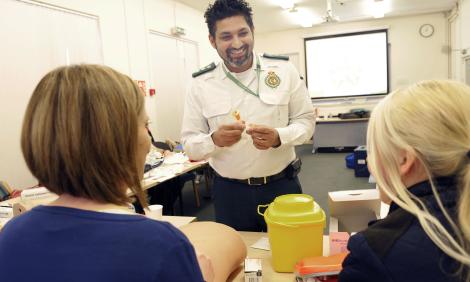Thinking about university
This page explains a little about university, the general entry requirements and the things you need to consider. There are links so that you can find out more.
For many jobs in organisations providing NHS healthcare you need to have studied at university. For certain careers, you have to take an approved pre-registration degree or higher diploma. For other careers, any degree subject is acceptable or you can train for a clinical career through an accelerated postgraduate course.
-
Doing a course at ‘university’ means taking a higher education (HE) programme that leads to a qualification at level 4 or above, such as a:
- degree, eg a BA or BSc (most are honours degrees)
- Diploma of Higher Education (DipHE)
- foundation degree
- Higher National Certificate or Diploma (ie HNC or HND)
HE courses are not only taken at universities, but may also be available at further education colleges and other types of learning providers.
Full-time degree courses usually last three or four years. Other HE courses normally take two years full time. Many HE courses can be taken part time or by distance learning, such as through the Open University.
With further study, you can usually top up a foundation degree, HNC, HND or DipHE to achieve an honours degree.
It is essential to check what training you’ll need for the career you’re considering. See our Explore roles section and use our course finder.
-
To be accepted for a degree or DipHE course, you need at least two A levels or an equivalent level 3 qualification, such as a level 3 BTEC or OCR (possibly with an A level alongside). You also have to have supporting GCSEs or equivalent qualifications. Entry to degrees in clinical subjects can be very competitive, so you may need more than the minimum. Specific subjects (such as science) are often specified. Sometimes entry requirements are stated in UCAS Tariff points.
For other HE courses, such as foundation degrees, entry requirements are often more flexible, but you usually need at least one A level (or equivalent).
If you don’t have the usual entry qualifications, there are other ways to prepare for university. For example, you could take an Access course or opt for a degree with a foundation year (these are usually aimed at students who don’t have the relevant level-3 subjects eg science).
You should always check with the universities you're considering applying to, to make sure that the level-3 course or subjects you are currently studying (or plan to study) are acceptable for entry onto their courses.
For entry to most courses, you will need to show that you understand what the career and the course will involve (eg through relevant work experience). You may also have an interview and perhaps sit an entrance test or submit a portfolio of your work.
If you are applying for an NHS-funded course at university, you'll be asked to show how you think the NHS values apply to the career or course you're considering. The NHS values form a key part of the NHS Constitution. Find out more about the NHS Constitution.
-
University isn’t for everyone but it can give you:
- the chance to study something that you’ll really enjoy
- access to an interesting and rewarding career (regardless of your subject, you will develop skills that are in demand by employers, such as self-motivation, research and writing skills)
- an opportunity to develop as a person, meet new people, get involved in different interests and activities and learn to live independently
You will need to think about the costs involved and paying off your student debt when you’ve finished your studies. Financial support from the NHS for students on approved courses has been available for some time. However this is changing from August 2017. Visit our financial support page for the latest information.
Our 'at university' pages have information on choosing subjects, deciding where to study, applying through UCAS and details about the financial support.




